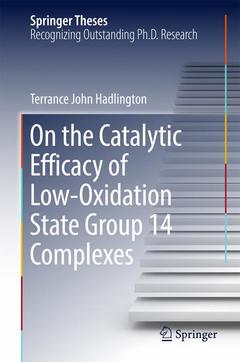Description
On the Catalytic Efficacy of Low-Oxidation State Group 14 Complexes, Softcover reprint of the original 1st ed. 2017
Springer Theses Series
Language: English
Subjects for On the Catalytic Efficacy of Low-Oxidation State Group...:
Publication date: 02-2017
Support: Print on demand
Publication date: 07-2018
Support: Print on demand
Description
/li>Contents
/li>Biography
/li>Comment
/li>
This outstanding thesis describes a detailed investigation into the use of low-oxidation-state group 14 complexes in catalysis, developed at the cutting edge of inorganic and organometallic chemistry. It includes the preparation of a number of landmark compounds, some of which challenge our current understanding of metal?metal bonding and low-oxidation-state main group chemistry. Among the many highlights of this thesis, the standout result is the development of the first well-defined, low- oxidation-state main group hydride systems as highly efficient catalysts in the hydroboration of carbonyl substrates, including carbon dioxide, which are as efficient as those observed in more traditional, transition-metal catalyses. These results essentially define a new subdiscipline of chemistry.
These books may interest you

Advances in Organometallic Chemistry 176.01 €

Metal-Metal Bonding 316.49 €

Advances in Organometallic Chemistry 176.01 €

